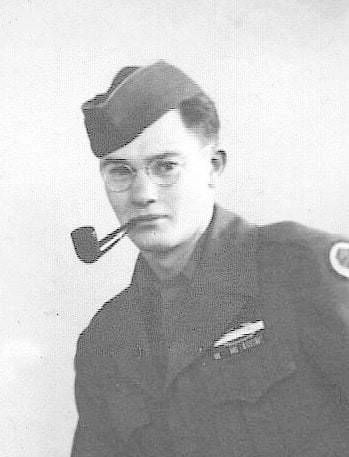- Master Sergeant
- WW II
Biography
Eliot Annable was born in 1924 in Bangor, Maine where his father was a teacher. The family moved to Riverside, RI in 1927. Eliot attended East Providence HS graduating in 1942. He was in the band, playing the clarinet. He entered RISC in January 1943, was in Phi Mu Delta fraternity and was in ROTC. He also briefly played in the band. Eliot was drafted into the Army in May 1943. After WWII, he returned to URI graduating in 1949 with an engineering degree.
With his induction into the Army, MSGT Annable was sent to Fort McClellan, AL for infantry basic training. He was selected for the Army Specialized Training Program (ASTP) at Auburn University. After completing the program, he was to be commissioned as an officer but in the spring of 1944, the program was terminated and Eliot, then a private, was assigned to C Company, 2nd BN, 423rd Infantry Regiment, 106th Infantry Division, The Golden Lion Division. He was later transferred to 423rd Regimental Headquarters Company communications platoon and became a radio operator after training at the Infantry School at Fort Benning, GA.
The division, along with MSGT Annable, embarked on the Queen Elizabeth, crossed the Atlantic, and docked at Glasgow, Scotland. The Division was then sent to France and on to Belgium to replace the 2nd Infantry Division along the Siegfried Line in the Schnee Eifel on 11 December 1944, five days before the start of The Battle of the Bulge. Because it was thought to be a “quiet sector” and that the German Army was too weakened to be a threat, the 106th defended a 21-mile sector when a normal division sector was only 5 miles.
On 16 December 1944, The Germans attacked in force, over-running and surrounding the 422nd and 423rd Regiments, both of which were forced to surrender at Schonberg on 19 December. On December 16, MSGT Annable and a fellow radio operator, were dispatched to a supporting cavalry squadron, to provide communications back to the 423rd. On December 17 they were surrounded, came under intense shelling and given a surrender demand which they refused. They destroyed as much of their equipment as possible, broke up into small groups to attempt to infiltrate back to American held territory. After five days in the Ardennes forest escaping capture and with no winter clothes or food, MSGT Annable and his fellow radio operator, broke through to elements of the 82nd Airborne Division. They were returned to remnants of the 106th and became part of the 1st battalion, 424th Regiment which regrouped in the vicinity of Malmedy.
The 424th and remnants of the 422nd and 423rd, including MSGT Annable, were joined by the 7th Armored Division in the defense of St. Vith and held out until December 21. The defense of St. Vith was credited with ruining the German time table in their drive to take Antwerp.
Throughout the remainder of the war in 1945, MSGT Annable remained in the 1st battalion of the 424th Regiment. He was later transferred to the 3rd Armored Division and then the 2nd Armored Division. In January 1946, MSGT Annable returned to the United States with the 2nd Armored Division and was discharged in February 1946. For his contribution to the Battle of the Bulge and follow-on operations, he was awarded the Bronze Star, the Combat Infantry Badge, and campaign ribbons for Northern France, the Ardennes (the Battle of the Bulge), and the Rhineland.
After discharge, Eliot got married, returned to URI and completed his degree in electrical engineering in 1949. He was hired by Westinghouse as an engineer and worked in their Air Arm Division in Baltimore, Maryland for 35 years retiring in 1984. His contribution was in airborne radar design and radar system testing in aircraft such as the F4 Phantom, F16, and AWACS.
Eliot was an accomplished musician on both the clarinet and saxophone. While still in high school he was playing in dance bands playing professionally at age 15. While at Auburn University, in the ASTP, he played in the Auburn Knights. He also rehearsed with the Blue Baron Band, a well-known band at the time, during the short time they were the 106th Division band at Camp Atterbury. As a union musician in Baltimore and Washington he has played with his own band and other local bands as well as volunteering to play at charity events. Music is a love of his life and he played commercially to age 96. Eliot was also a private pilot and motor cycle enthusiast having been active in a local motorcycle club. He has 4 children and numerous grand, great and great-great grandchildren. He resides in New Windsor, Maryland.
Master Sergeant Eliot Annable’s exemplary performance of duty is in keeping with the finest traditions of the military service and reflects great credit on his family, the University of Rhode Island, and the United States.
Education
1949

